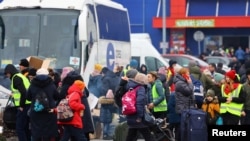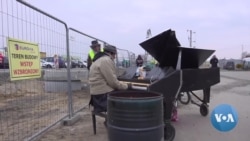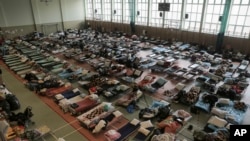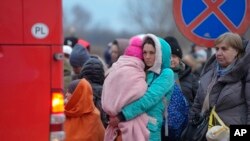A surreal soundtrack greets the sea of humanity fleeing Ukraine: a highly accomplished pianist has arrived at the Medyka border crossing into Poland. His music drifts across the organized chaos of this small village, now the frontline of Europe’s rapidly growing refugee crisis.
German pianist Davide Martello has visited numerous conflict zones in recent years, towing a grand piano behind his bicycle on a powered trailer, a white "peace" sign painted on its lid. Children encircle him as the melodies bring the crowd of refugees to a standstill. After long, dangerous journeys escaping the war, they seem dazed.
Adrenaline has given way to exhaustion.
Refugee crisis
At least 1.7 million people have fled Ukraine to neighboring countries since the Russian invasion, creating Europe’s fastest growing refugee crisis since World War II. Of those, more than one million have fled to Poland. They have been largely embraced by their European neighbors.
Most new arrivals are bussed to reception centers away from the frontier. Some have family or friends in Poland or further afield in Europe where they can stay. A few take up volunteers’ offers of car rides and accommodation in cities across the continent.
But many have nowhere to go. They are given beds in shelters set up in schools, theaters and gymnasiums close to the border. From there, they are able to connect with Polish citizens offering rooms or even entire apartments and houses.
Shelters
Yevgenia, who did not want to give her full name, spoke to VOA as she arrived at a shelter recently set up in a school in the nearby town of Przemysł. Three of her four children sit close by.
“My husband is in Ukraine, they didn’t let him leave,” she explained. “And also, my older son — he’s 18, he also had to sign up [to the army]. So, we’re separated. We are constantly in touch. We’ve set up a family [messaging] group, we keep each other informed of what’s going on, we see each other all the time.”
Yevgenia says she has been welcomed in Poland. “Volunteers come to us and offer us opportunities, where we can go, where there is work. We want to work so we’re not dependent on someone else, so we can be useful for something,” she told VOA.
The school’s head teacher Małgorzata Ziober oversees the shelter. She now has hundreds of refugees under her care.
“The worst moments are when, for example, a minibus arrives at night and we take in babies that are four or five months old. It’s really very emotional and I think not everyone is suited to cope with that. We can do it, because we are strong. We don’t know for how long. As long as we have the strength, we will help,” Ziober said.
Trauma
Next-door, a cultural center has been transformed into a temporary shelter. The staff — whose normal job involves staging concerts and movie screenings — have transformed themselves into chefs, cleaners, nannies and counsellors for the refugees. They have been overwhelmed with donations from local residents and businesses.
“Mostly, when [refugees] come to us, the separation is a big trauma. They are crying. Then they are grateful that they ended up here, that there are such good people. And after a stay of one or two days, we get used to each other, a bond is formed between these people and they become like one big family,” local politician Janusz told VOA, as he helped to deliver new supplies to the shelter.
“At first the refugees are shocked, they want to shout, they want to talk out loud what they experienced, what they went through, what their escape was like. And then slowly they calm down and get used to the new reality — that they have to go on living,” Zapotocki said.
Polish-Ukrainian bonds
The historical bonds run deep across the border. The cathedral of the Ukrainian Greek Catholic Church is situated in the picturesque old town in Przemysł — on the Polish side of the border. Its giant bells rang out across the town Sunday morning as a special prayer service and collection was held for the people of Ukraine. The service was broadcast live on television across Poland.
Despite the warm welcome, many Ukrainian refugees in the shelters say they hope to return home within weeks, clinging to a belief that this dizzying upheaval will soon be over. As they scroll through their phones and see the images of death and destruction in the land they left behind, that hope is visibly draining away.








